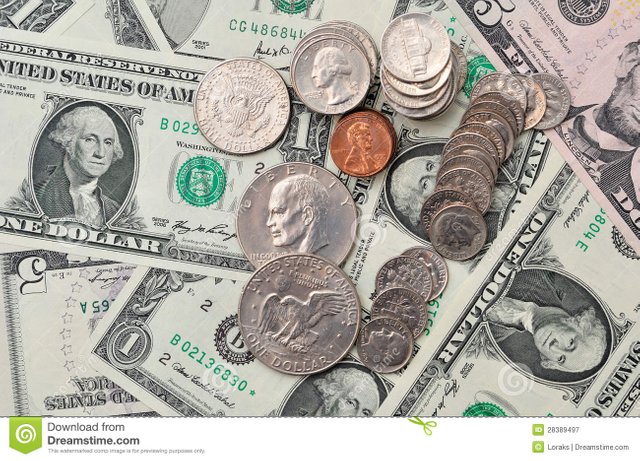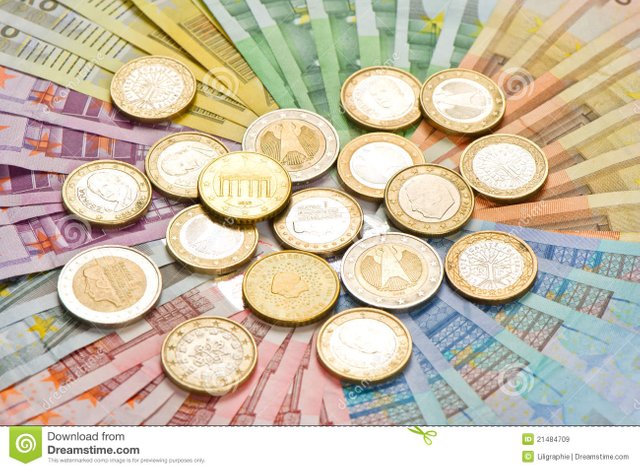Ing /Esp: Dolarizar la economía o no dolarizarla. ¿Cuál es el dilema? Una interpretación económica.Segunda parte. .
To dollarize the economy or not to dollarize it. What is the dilemma?
An economic interpretation. Second part.

Image taken from the Web:
There are two kinds of economists; those who want to make the rich richer and those who want to make the poor less poor.
José Luis Sampedro (1917-2013) Spanish writer and economist.
What is the dilemma?
Continuing with the subject of the Dollarization of the economy and its feasibility, in a country that accepts it officially the exchange problems that arise when acquiring one currency for the other and the problems of the "local" currency regarding the inflationary issue also disappear. But immediately a "relationship" is created with the issuing country of the adopted currency losing its monetary independence and adopting the policies of the assumed currency which means that the products that are sold at a stipulated price in the United States will have the same value in the "receiving" country of the currency and the Real Estate issue may have an increase in value due to the increase of the economy.
Interest rates are similar between countries which means that in some way the exchange rate favors to stabilize the economy of the "receiving" country, although in terms of "financial integration", this may change a little. Economically it is subject to the economic changes of the "sending" country to the point that it cannot face economic shocks such as those that occur with the rise in oil prices, although there are economic outlets but always facing losses and gains that lead it to make adjustments in wages, salaries, taxes, among others, but the adjustments made by the receiving country are not the same and do not have the same implications as those of the sending country since the needs are not the same.
In terms of "financial integration" this does not necessarily have to exist or be integrated as well, it does not come "with the package", each economy is different, the production systems are different, but in that sense for financial integration to exist the "receiving" country must accept that foreign financial institutions compete with national institutions, which can even be "criminal" if we think about it seriously, since obviously the "issuing" country has a strong economy that allows the development of strong institutions with a vast number of resources that the "receiving" country does not have.
A good financial integration does not discriminate between foreign and local financial institutions, and develops economic policies that safeguard the "national patrimony" since it is very feasible that foreign financial institutions can buy the national financial institutions leaving the receiving country without its own institutions and with the resources under foreign domination moving funds in and out of the country.
The banking entities that generate financial loans are generally not within the deposit centers but outside the receiving country, so that the liquid funds of the same are managed from abroad without a foothold within the same country because it is considered less risky due to the exchange rate management between both countries and cost reasons, which forces the local banking entities to compete with foreign institutions and even receive funds from them when the local institutions require it as a substitute for the central bank.
The benefit of a country not issuing banknotes is that the government of the receiving country cannot make decisions regarding the circulating currency because it does not own it, and the absence of a central bank makes the economy more flexible depending on the interest rates of the issuing country.
In short, it would seem that an OFFICIALLY DOLLARIZED country stabilizes its economy but consequently loses sovereignty and is at the mercy of the issuing country of the assumed currency. It cannot make economic decisions, neither good nor bad, it cannot assist its banking entities since it depends on the injection of money from foreign banks and in my opinion if you have no power or control of your economy you are subject to the decisions made by the country whose currency you assumed, in short, you have economic stability but you have no job security since the nation state cannot guarantee labor stabilization nor give you labor guarantees because the labor sources are not theirs, you have no protection.
This topic has been biting and has spread to stratospheric levels! Especially because you must remember that these are only interpretations and as I do not want you to fry your brains with me, (since that is my job) for now I will leave this topic until here but not before inviting you to continue with me in these "economic interpretations" in this and in future installments.
References:
.-.-.-.-.-.-.-.-.-.-.-.-.-.-.-.-.-.-.-.-.-.-.-.-.-.-.-.-.-.-.-.-.-.-.-.-.-.-.-.-.-.-.-.-.-.-.-.-.-.-.-.-.-.-.-.-.-.-.-.-.-.-.-.-.-.-.-.-.-.-.-.-.-.-.-.-.-.-.-.-.-.-.-.-.-.-.-.-.-.-.-.-.-.-.-.--.-.-.-.-.-.-.-.-.-.-.-.-.-.-.-.-.-.-.-.-.-.-.-.-.-.-.-.-.-.-.-.-.-.-.-.-.-.-.-.--.-.-.-.-.-.

Image taken from the Web:
Hay dos clases de economistas; los que quieren hacer más ricos a los ricos y los que queremos hacer menos pobres a los pobres.
José Luis Sampedro (1917-2013) Escritor y economista español.
¿Cuál es el dilema?
Continuando con el tema de la Dolarización de la economía y su factibilidad, en un país que la acepta de forma oficial los problemas de cambio que surgen al adquirir una moneda por la otra y los problemas de la moneda “local” en lo referente al tema inflacionario también desaparecen. Pero inmediatamente se crea una “relación” con el país emisor de la moneda adoptada perdiendo su independencia monetaria y adoptando las políticas de la moneda asumida lo que quiere decir que los productos que se venden en un precio estipulado en Los Estados Unidos tendrán el mismo valor en el país “receptor” de la moneda y el tema de Bienes Raíces puede tener un incremento en valor debido al incremento de la economía.
Las tasas de interés son similares entre países lo que quiere decir que de alguna forma el cambio favorece a estabilizar la economía del país “receptor”, aunque en temas de “integración financiera”, esto puede cambiar un poco. Económicamente está sujeto a los cambios económicos del país “emisor” al punto que no puede hacer frente a los choque económicos como los que ocurre con el alza del petróleo, aunque hay salidas económicas pero siempre enfrentándose a pérdidas y ganancias que lo llevan a hacer ajustes en sueldos, salarios, impuestos, entre otros, pero los ajustes que haga el país receptor, no son los mismos ni tienen las mismas implicaciones que las del país emisor ya que las necesidades no son las misma.
En temas de “integración financiera” este no necesariamente tiene que existir o integrarse también, no viene “con el paquete”, cada economía es distinta, los sistemas de producción son distintos, pero en tal sentido para que la integración financiera pueda existir el país “receptor” debe aceptar que las instituciones financieras extranjeras compitan con las instituciones nacionales, lo cual puede ser hasta “criminal” si lo pensamos seriamente, pues obviamente el país “emisor” tiene una economía fuerte que permite el desarrollo de instituciones fuertes con un vasto número de recursos que el país “receptor” no tiene.
Una buena integración financiera no discrimina entre las instituciones financieras extranjeras y locales, y desarrolla políticas económicas que salvaguarden el “patrimonio nacional” ya que es muy factible que las instituciones financieras extranjeras puedan comprar a las instituciones financieras nacionales dejando al país receptor sin instituciones propias y con los recursos bajo el dominio extranjero moviendo los fondos dentro y fuera del país.
Los entes bancarios generadores de préstamos financieros por lo general no están dentro de los centros de depósitos si no por fuera del país receptor por lo que los fondos líquidos del mismo se manejan desde el exterior sin un asidero dentro del mismo país por considerarlo menos riesgoso en función del manejo de las tazas de cambio entre ambos países y razones de costo, lo que obliga a las entidades bancarias locales a competir con las instituciones extranjeras y hasta recibir fondos de las mismas cuando las instituciones locales lo requieran como un sustituto del banco central.
El beneficio de que un país no emita billetes permite que el gobierno del país receptor no pueda tomar decisiones en relación a la moneda circulante por que no es dueño de la misma, y la ausencia de un banco central hace que la economía sea más flexible en función de las tasas de interés del país emisor.
En pocas palabras, pareciera que un país OFICIALMETNE DOLARIZADO estabiliza su economía pero en consecuencia pierde soberanía y queda a merced del país emisor de la moneda asumida. No puede tomar decisiones económicas, ni buenas ni malas, no puede asistir a sus entidades bancarias pues depende de la inyección de dinero proveniente de la banca exterior y a mi parecer si no tienes poder ni control de tu economía estas sujeto a las decisiones que tome el país cuya moneda asumiste, en pocas palabras, tienes estabilidad económica pero no tienes seguridad laboral pues el estado nación no puede garantizarte estabilizada laborar ni darte garantías laborales por que las fuentes de trabajo no son suyas, no tienes protección.
Este tema picó y se extendió a niveles ¡estratosféricos! Sobre todo porque han de recordar que son solo hago interpretaciones y como no quiero que se frían el cerebro junto conmigo, (pues ese es mi trabajo) por ahora dejaré este tema hasta aquí no sin antes invitarlos a que continúen a mi lado con en estas “interpretaciones económicas” en esta y en próximas entregas.
Referencias:
Greetings @hojaraskita
Very interesting publication that you present to us, with the diatribe of the governments in office, I particularly think that the dollarization that we currently live in our country will not be officialized, by historical political problems, however I share some of your opinions as:
It is not the same Venezuelan economy as other countries, for that reason they are not managed in the same way.
However, the country has a bubble economy that will soon explode in order to achieve its dreams. The important thing is to look for some strategies that I am sure we must find to get out of this difficult situation, but rescuing our economy of healthy management.
Thank you very much for sharing your publication